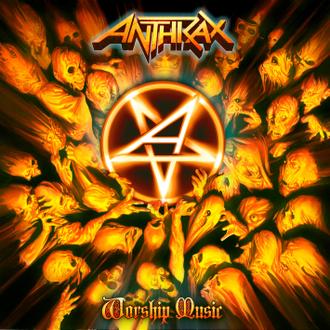
Album Review: Anthrax - "Worship Music"
And here we are. After a twisting, turning, practically soap-opera-plot sojourn, Anthrax’s long awaited “Worship Music” is finally available to the masses in the form that the band intended. Or at least, intended for the third time. In any event, we’re pretty sure this is it for revisions to the wayward, prodigal album of thrash metal’s recent cycle.
To say that “Worship Music” took a circuitous route to release is the understatement of 2011. That’s like saying Michael Jordan was “pretty good” at basketball, or that General Custer was “a little outmatched.” Seemingly destined for the Island of Misfit Toys, Anthrax finally put their thrice-recorded effort (Nelson, Belladonna vocal, song rewrites) to disc (or file, in the modern parlance,) and shipped “Worship Music” as a finished product.
Not entirely separate from Axl Rose’s “Chinese Democracy,” “Worship Music” may have spent a little too much time in the cooker. The constant rewriting serves to create a final product that endeavors in part to be all things to all people. The album musically finds Anthrax in a similar state of being to 1995’s “Stomp 442.” They seem at a crossroads and haven’t entirely picked a new direction.
“Worship Music” sits uneasily on the fence between pounding, thrash metal statement and hook-y mainstream pop metal. Now, far be it for us to sit and look down our noses at Anthrax for this partial evolution; it could be easily contended that the band has been trying to blend these elements for many years, especially in consideration of the B-side of “We’ve Come For You All.” The issue this creates is that it makes for disjointed transitions between songs and within songs. It becomes difficult to locate the single identity that Anthrax wants to operate under. “Worship Music” seems to have a lot of spit-balled ideas, some of which do not hit and leave the album without a sense of unyielding conviction.
The most curious development is that Joey Belladonna has truly matured into a more believable, robust vocalist, while musically the band is still steadfastly carrying the banner for some of the original tenets of American thrash. “Earth on Hell” is laid into the mold of so many Anthrax hits from the past: buzzsaw guitar riffs high on distortion dovetailed into powerful, fist-banging refrains. It is this precise construction, leftover from the early 1980’s, that allows Anthrax to retain their original image while at the same time expanding with new ideas.
What Anthrax deserves credit for is in not just trying to emulate modern heavy metal, but in truly assimilating those themes into their own image. “The Giant” is a song where Anthrax combines a rapid-fire verse with a colorful, virile chorus. While it can be argues that Anthrax was one of the originators of said pattern, it was taken and molded into something new by generations that followed, then passed back to Anthrax for review. Like a phoenix, Anthrax has recreated themselves in their own reflected image.
While most of the album downplays the historically intrinsic, light hearted, back-and-forth groove of Anthrax, “Judas Priest” sounds like it could have been a track hidden in the middle of “Persistence of Time.” The problem is that Anthrax killed this song by making it one chorus too long.
However, speaking of the song “Judas Priest,” Rob Caggiano deserves a lot of credit for his outstanding guitar work on “Worship Music.” While Dan Spitz is still largely remembered as Anthrax’s preeminent guitar player, it is not hyperbole to say that Caggiano is the most talented player the band has had to date. His ability to generate roof-rocking solos from thin air and then return seamlessly to the melody adds an element of depth to “Worship Music” without it the album would be sorely lacking. Caggiano’s ugly, de-tuned riff for “In the End” is the sole reason that the song is the album’s single best offering.
The only completely disposable effort on “Worship Music” is “The Crawl,” a pedantic catering to dramatic pop metal. If you skip it, no one would blame you. There are also fundamentally good songs like “I’m Alive,” which possess a flaw such as an overblown chorus or a riff that doesn’t quite mesh.
While not as defining as “Among the Living,” or as unified as “Sound of White Noise,” “Worship Music” is nonetheless a worthwhile listen, if at least to hear a band who is clearly still in love with music and the creation thereof. Many things can be said about Anthrax, but it can never be suggested that they have failed to put their all into any of their efforts. Listen to it for a taste of a band finding their way again after an ugly episode, and make sure to pay attention to Caggiano’s guitar. “Worship Music” isn’t flawless, but there’s much more good than bad.

